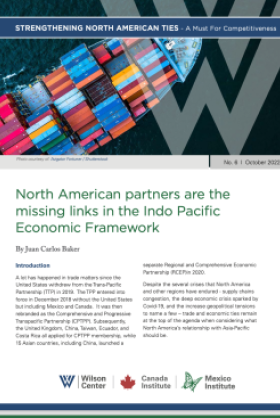North American partners are the missing links in the Indo Pacific Economic Framework



A lot has happened in trade matters since the United States withdrew from the Trans-Pacific Partnership (TTP) in 2019. The TPP entered into force in December 2018 without the United States but including Mexico and Canada. It was then rebranded as the Comprehensive and Progressive Transpacific Partnership (CPTPP). Subsequently, the United Kingdom, China, Taiwan, Ecuador, and Costa Rica all applied for CPTPP membership, while 15 Asian countries, including China, launched a separate Regional and Comprehensive Economic Partnership (RCEP)in 2020.
Despite the several crises that North America and other regions have endured - supply chains congestion, the deep economic crisis sparked by Covid-19, and the increase geopolitical tensions to name a few – trade and economic ties remain at the top of the agenda when considering what North America’s relationship with Asia-Pacific should be.
Author


Mexico Institute
The Mexico Institute seeks to improve understanding, communication, and cooperation between Mexico and the United States by promoting original research, encouraging public discussion, and proposing policy options for enhancing the bilateral relationship. A binational Advisory Board, chaired by Luis Téllez and Earl Anthony Wayne, oversees the work of the Mexico Institute. Read more


Canada Institute
The mission of the Wilson Center's Canada Institute is to raise the level of knowledge of Canada in the United States, particularly within the Washington, DC policy community. Research projects, initiatives, podcasts, and publications cover contemporary Canada, US-Canadian relations, North American political economy, and Canada's global role as it intersects with US national interests. Read more

Explore More
Browse Insights & Analysis
360° View of How Southeast Asia Can Attract More FDI in Chips and AI




